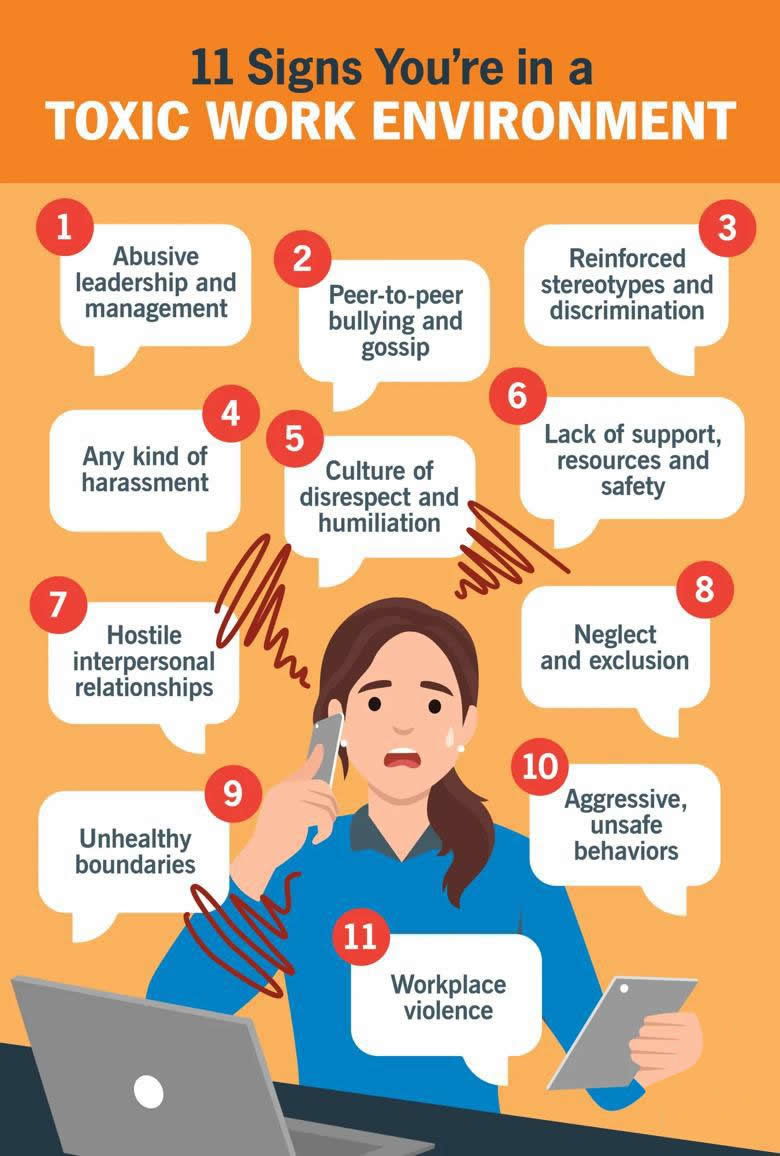11 Signs of a Toxic Work Environment
A hostile work environment can foster a culture of aggression, doubt and negativity that’s harmful to your health and success

If you dread going to work and walk away most days feeling defeated or discouraged, you might be dealing with a toxic work environment. Unhealthy work conditions can have a significant impact on your physical, mental and emotional well-being. If you have a boss with unrealistic expectations or hostile coworkers who are hard to trust, work can become harmful to your overall health.
If this sounds like your situation, it may be time to seek new employment or ask for help. Clinical health psychologist Amy Sullivan, PsyD, shares some of the signs of a toxic environment and how to manage your health if you’re feeling stuck.
What is a toxic work environment?
A toxic work environment fosters a disruptive and persistent culture of negativity, doubt and aggression. This results in high levels of stress, strained relationships and poor production or performance. If you’re unable to resolve conflicts in this environment or you’re unable to find better employment opportunities, your health can be negatively impacted in the following ways:
- You have a physical, nauseated gut reaction to work.
- You have trouble sleeping because you’re hyper-focused on work issues.
- Your anxiety spikes in the hours or minutes before work.
- You have stress-related tightness in your muscles or joints.
- You have little to no motivation to work and/or no desire to improve your performance.
“A toxic work environment is a feeling and not necessarily a checklist,” clarifies Dr. Sullivan. “Pay attention to what your gut is sharing with you, as well as any physical responses you have before, during and after work.”
11 signs of a toxic environment

In 2024, researchers classified 11 examples of toxic work environments:
- Abusive supervision: Leaders humiliate employees and uphold unrealistic or unethical expectations (like unpaid overtime) that result in poor work-life balance.
- Bullying: People use intimidation or aggression to isolate, undermine or offend employees and coworkers.
- Unfair advantages: Some employees are favored over others, while some are denied opportunities to improve. Leaders may also reinforce harmful assumptions.
- Harassment:Sexual, racial, religious and disability harassment can disrupt someone’s success, make them feel unsafe and directly harm their well-being.
- Incivility: Microaggressions like offensive comments and jokes are common in a toxic workplace, along with other disrespectful behaviors like dishonesty.
- Interpersonal deviance: Gossiping, stealing, discrediting and overt or subtle threats can all increase hostility among coworkers.
- Interpersonal justice: When people aren’t treated with dignity and respect, they may have difficulty finding support and assistance if they’re being mismanaged.
- Ostracism: Someone may not feel comfortable voicing their concerns or speaking up for themselves if coworkers and managers make them feel ignored.
- Social undermining: Belittling someone in meetings, spreading rumors and making someone feel inadequate in a group setting can damage someone’s self-esteem.
- Workplace aggression: Broadly defined as behavior intended to cause harm, aggression can be verbal, physical or even disrupt someone’s performance.
- Workplace violence: Physical assault and harsh verbal aggression result in increased anxiety, dissatisfaction and depression.
“A toxic work environment is an environment where there’s inconsistent, biased and confusing communication, and where your leader is not respectful or responsive to your needs,” states Dr. Sullivan.
“Leaders need to be able to communicate. Employees also need a safe space for communication and to ask for help. And if help isn’t offered, that’s a huge sign something is wrong.”
Other signs of a toxic work environment can include:
- High turnover rates
- Low morale and burnout
- Lack of transparency and accountability
- Poor trust in leadership and/or human resources
How to deal with a toxic work environment
A toxic work environment is a dangerous place to be, both for your physical and mental health. But there are some things you can do in the moment that can help you manage some of your symptoms and improve your situation.
- Go to therapy for guidance on how to manage conflicts in healthy ways.
- Find a coach who’s in your field who can provide a fresh perspective.
- Set personal boundaries at work.
- If you feel safe and supported doing so, make a complaint with human resources.
- Take mental health breaks throughout the day.
- Make time for self-care before and after work.
- Strengthen your relationships with like-minded coworkers.
- Turn to your support system outside of work for advice.
- Focus on what you can control.
As Taylor Swift would say, “When the dinner is cold and the chatter gets old, you ask for the tab.” If you’ve tried other things and nothing seems to be working or getting any better, it might be time to leave your job.
“Don’t settle for a toxic work environment. It’s not worth your physical or psychological health or your important relationships,” advises Dr. Sullivan. “There are ways you can manage your emotions, but if you’re being disrespected, it’s certainly not OK to continuously stay in that environment.”